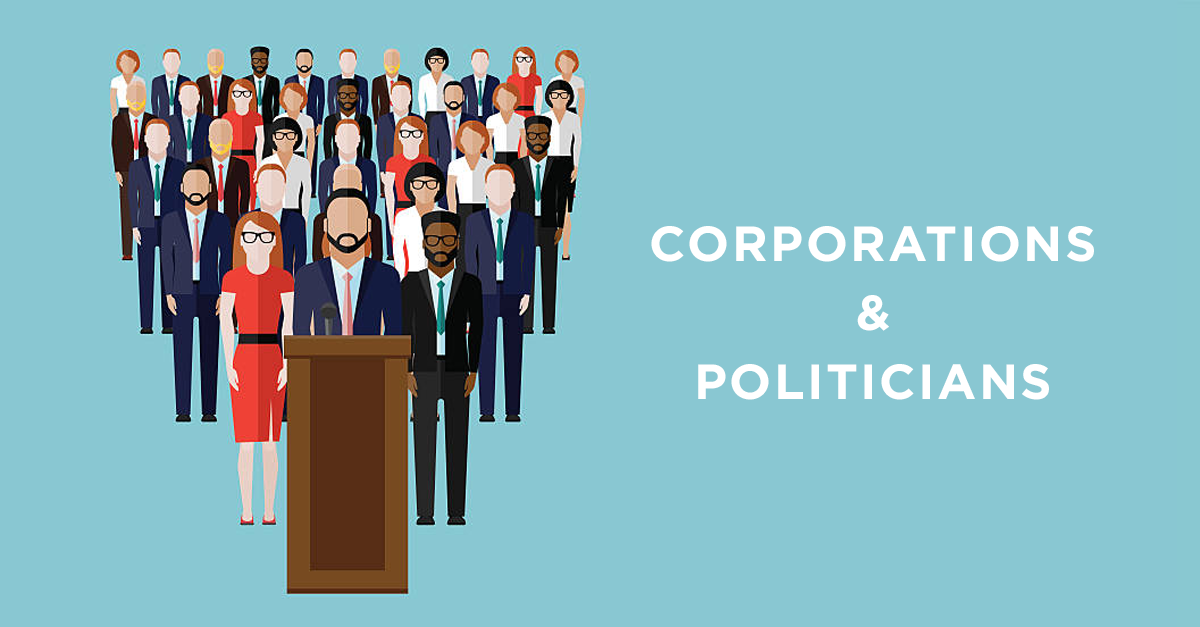Leadership is a core requirement for human society to function and be prosperous. Thousands of years ago, as our communities grew in size beyond tribes and joint families, our ancestors created the mechanisms that would allow larger groups to work together in mutual interest. However, while this leadership became necessary to give direction and prevent chaos for a larger number of people to work together in harmony, the other side of the coin was the power that leadership started assigning to the leaders.
Power over a large group is a huge opportunity to create a win-win situation for all those who are under its influence. However, human history is a testament to the fact that such power has, much more often, been misused to create wealth for a small number, at the cost of others.
The answer to the question that the title of this blog poses is therefore easy in principle but often not in practice. Clearly, the nature of the relationship between a corporation and politicians is what determines whether it is a bane or a boon to society at large. If the relationship is driven by a vision that reconciles profits and corporate ambitions with the greater good, it can be a means to generate employment, constructively regulate human activity and create widespread prosperity. On the other hand, the very same mechanism can be exploitative and act as a very destructive force.
Those of us who remember the early nineties can recall the fall of the Soviet Union. It is often cited as being the fall of communism. Having been an entrepreneur for all of my adult life, I sometimes wonder if what we refer to as capitalism fell even before that moment in history, perhaps even a couple of centuries ago. Let me explain my reason for that speculation. In principle, capitalism equates to free markets. These days, with countries declaring a ‘trade war’ on each other and tariff barriers being a common thing, we often assume that ‘free markets’ are simply about goods and services being able to move freely across national borders. If we consider the term more deeply, however, a free market is basically one in which merit prevails. In my opinion, a free market, and therefore real capitalism, can only be said to exist if there is a high likelihood for the best entrepreneurial idea to succeed. Providing the paying customer with the best possible goods and services at the most competitive price should be the basis of
any truly capitalism. A truly free market does this by giving all entrepreneurs, established and new, a level playing field. This allows the best innovations to emerge and for demand to set a fair price.
However, the undue influence of corporations in politics, and the willingness of politicians to come under this influence, has resulted in a system that might be called capitalism in label but is actually cronyism in practice. Cronyism by definition is the appointment of friends and associates to positions of authority, without proper regard to their qualifications. And this is where the disconnection with merit and true capitalism starts.
Lets look at the other side of this equation. Communism sounds great in principle but removing or restricting private ownership creates even harsher consequences for people than out of control corporate greed. Unfortunately, by its nature, communism cannot create stable societies in the real world. Limiting human aspiration and insisting that a person must act as part of a collective will inevitably create much more oppression that any other model. Where does the solution lie then?
One of my most staunchly held beliefs is that ethics and morality are the most valuable assets of humans. In fact, without these guiding principles and codes of conduct, it is not possible to have civilization, in the truest sense of the ‘civil’. So when we look at centralized political power, in principal it is a protection against anarchy and ‘might is right’. It allows larger groups of people to identify as one and makes them less vulnerable. By pushing capital back into the economy and creating cycles of employment, production and consumption, corporations are performing an ancient and essential function.
However, as enablers, these corporations also gather power. This is why, ultimately, the role of compassion towards others, a commitment to moral behavior and a focus on the greater good of all needs to remain the guiding principle, as opposed to greed and self interest.
Fortunately, all around us, we find people becoming more aware of their social responsibilities. Human beings are waking up from the purely selfish interest driven view that seemed to have temporarily hypnotized our civilization. A middle ground between material aspiration and
concern for common good is once again becoming energized. I believe this was inevitable. It is my hope that what will emerge from this renewed commitment to morality and ethics will make the question in the title of this blog redundant.
While it will always be the case that some political or corporate power will be misused, hopefully in the vast majority of cases, an evolved and morally engaged approach will prevail. Our values are the very basis of our humanity and adherence to them will, in the long run, always produce the most widespread and sustained prosperity.

